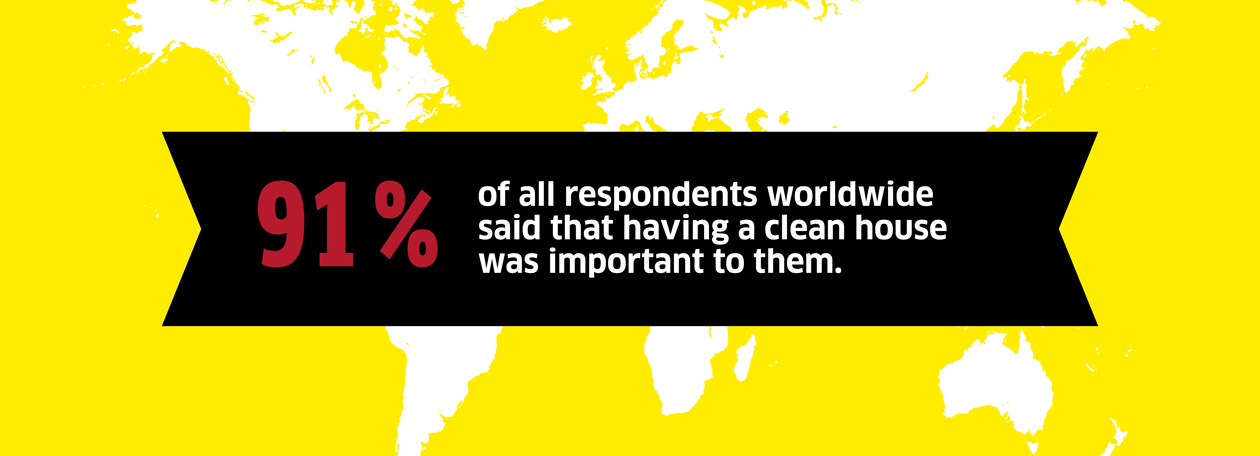"Everyone likes it clean"

However, an international comparison of cleaning habits shows surprising differences
就清洁而言,世界有一个共同点:一个干净的家庭对几乎每个人都很重要或非常重要。这表明家庭清洁,无论是经常还是不规则,都只是生命的一部分。但正是这一切落后于此?谁花费最多时间清洁,最常用的艾滋病用于清洁?作为清洁设备的专家Kärcher希望了解更多并与现在的研究一起进行代表性调查。关于他们的个人清洁行为,调查了来自巴西,中国,德国,法国,波兰和美国的超过6,000名参与者。它出现了存在一些相似之处,而且还有典型的差异和特殊性。
Cleanliness is particularly important to Brazilians, Poles are more generous
全球约90%的受访者说clean home was important or very important. In Brazil, 97% of those surveyed said that cleanliness was important; in Poland, this was 87%. The other countries surveyed lie between these figures. By comparison, the Germans, who are regarded worldwide as being particularly clean, are somewhere at the bottom of the scale with 89%. When asked how much time they spent cleaning weekly, on average German households replied 3 hours and 17 minutes. Accordingly, the Germans come close to the other countries surveyed (3 hours 20 minutes). In Brazil, an average of 4 hours 5 minutes are spent cleaning, just under 10% of those surveyed said that they spent more than 10 hours cleaning.

Interview: Where is it the cleanest?
We discussed the partly astounding results and differences with Gerhard Reifmesser, Head of Kärcher Market Research.
先生Reifesser,你会说那些花更多时间清洁的人有一个清洁的家吗?
That would be too simplistic. The amount of time spent cleaning depends on the devices used. Using electrical devices can save time. A typical peculiarity of the cleaning culture in Brazil is, among other things, that cleaning takes place manually using large amounts of water. Houses typically have stone floors and the kitchen often opens to one side on to a type of terrace, the so-called Lavanderia. This allows the kitchen floor to be washed and cleaned. Noticeable are also the powerful and fragranced detergents – a fresh scent signals cleanliness.
您是否了解全球清洁文化及其基于您自己的经验的差异?
Yes, we market researchers conduct virtually all of our studies locally, speak to people, look at their homes and how they clean. I spend about a quarter of my working time conducting such studies in the global markets for our products.
在您看来,哪个国家是最干净的?
日本。在这方面,日本人有不同的心态。清洁是角色建筑的一部分。学童和学生学会自己清理他们的学校。保持周围环境清洁的成年人被视为与自己和平和平的人。社区也起到了特殊的作用。在星期天,人们可以看到许多志愿者清洁公共设施并收集垃圾。在其他地方没有什么比这更喜欢的。
In addition to cultural differences, are there also fundamental similarities in cleaning habits?
To put it simply: everyone likes it clean. However, the perception of cleanliness is individually and culturally influenced. In the UK, Russia or the USA, the cleaning behaviour of a typical Japanese household is perceived as greatly exaggerated.
德国人有多清洁?
如果一个人考虑在德国家庭清洁的平均时间,我们就在底部的某个地方。德国非常干净,整洁,比现实更加陈词滥调。想想春季清洁:曾经是一个几乎消失的常见仪式。但是,正如我已经提到的那样,它取决于所用的清洁装置。德国家庭在使用电器家用电器时高于平均水平。
And the Japanese who are known to love technology?
这是进一步的日本特点发挥作用的地方:狭窄的生活条件。即使在我们调查的中国市场,也可以平均使用更多的生活空间。日本住宅小,往往窄,分布在几层。在日本,优选电池供电的设备。由于缺乏存储空间,这些通常存储在可见的地方。这对产品设计有不同的要求。因此,Kärcher已经开发了几种专门适应日本习惯的产品。
How much time do you personally spend cleaning your home per week?
I think this is somewhere within the German average. However, my wife says that she occasionally has to carry on cleaning when I have finished. Incidentally, this too is a global phenomenon: men are sharing the housework to an increasing extent, but women still feel as if they are mainly responsible for this task.

